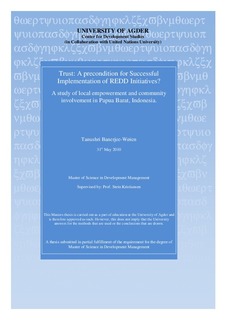| dc.description.abstract | The purpose of this thesis is to discuss the issue of whether trust is a precondition for the
successful implementation of sustainable REDD initiatives in Papua Barat, Indonesia.
Research objectives have been to assess the forest dependency of the indigenous peoples of
Kampung Mokwam and Manokwari Utara and how this dependency affects their choice of
livelihoods. Involvement of governmental and nongovernmental organizations in the past and
present has given an indication of the trust levels that prevail in the Papua Barat setting. The
main objective has been to analyze how trust builds social capital, thus empowering
indigenous communities to actively participate in collective action through self-governance to
enhance common-pool resource management.
The theoretical basis of this research has had a focus on Elinor Ostrom´s (1990) work on
common-pool resource management with a basis on Hardin´s (1968) Tragedy of the
Commons. Coleman´s (1988) work on social capital and Kristiansen´s (2004) model on social
networks have also contributed to a better understanding of common-pool resource
management implementation in Papua Barat. Theories on empowerment, self-governance,
and good governance have aided in strengthening the theoretical framework for the purpose
of analysis. The contextual information on the history of Indonesia and Papua Barat in
addition to the presentation of the concept of REDD have also been of use in analyzing trust
as a precondition for successful implementation of sustainable REDD initiatives.
The methodology used for the purpose of research was of a qualitative nature whereby
research was conducted through interviews and focus group discussions. Findings of the
research show that livelihoods of the two research areas reflect levels of indigenous forest
dependency and that both indigenous communities actively engage in small-scale
deforestation. However, in being aware of the environmental effects caused by deforestation,
the indigenous peoples are willing to engage in REDD initiatives with the assistance of
foreign organizations, as the levels of distrust between these peoples, the government, and
nongovernmental organizations is high, thus causing a social trap whereby all parts are
skeptical of engaging in collective action with one another. The social trap has its roots in the
history of the province, the lack of infrastructure, the blatant and apparent corruption issues
prevailing in the archipelago, and finally, a general lack of human capital and knowledge in
the setting of Papua Barat. Thus, trust is, without doubt, a vital precondition for the successful
implementation of REDD initiatives through empowerment and social capital build-up in
rural Papua Barat, Indonesia. | en_US |
